Institute News
The first presentation of the year was a hybrid event, at which Kenneth Wunch, discussed “Microbially Influenced Corrosion in Oil & Gas Systems.”
Kenneth holds the position of Energy Technology Fellow at Lanxess in Houston responsible for business development, technology transfer, and shaping the innovation pipeline and strategy for global oil and gas applications. He has 15 years in the industry including positions at Baker Hughes, BP and Dow, and extensive experience in development and field application of biocides, corrosion inhibitors & sulfide scavengers, and is the global Subject Matter Expert in oilfield microbiology, bioinformatics, reservoir souring, microbially influenced corrosion (MIC) and biofouling.
In his presentation, Ken gave an overview Microbially Influenced Corrosion (MIC) in oil & gas systems focusing on:
• Operations that introduce the threat of MIC
• Consequences of MIC including a case study
• MIC assessment and monitoring
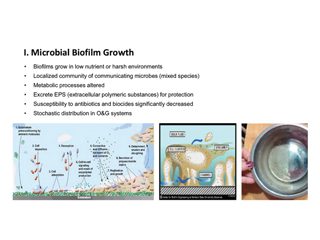
Risk management for MIC relies on the application of robust preventive barriers that typically involve the physical scraping of pipelines via oilfield “pigs”, and the chemical application of biocides and corrosion inhibitors.
These preventive barriers are analogous to the control of dental caries which uses scraping via a toothbrush along with a chemical application of toothpaste to limit the microbial growth. However, the surface active and reactive biocides that are applied in oil and systems are designed to prevent or remediate corrosion in much harsher environments.
Routine monitoring for microbial growth and general corrosion is imperative for MIC risk management. However, when preventive barriers fail, Reactive Root Cause Assessments (RCA) utilise various microbial analytical techniques (ATP, qPCR, metagenomics) to identify the underlying cause, and provide corrective actions. Often, these investigations produce unexpected results. For example, a RCA performed for corrosion issues that were suspected to be MIC-related, were actually caused by oxygen intrusion into the system, with identification of oxygen-tolerant bacteria being the key piece
of evidence.
Kenneth finished his presentation by discussing key performance indicators (KPIs) and MIC management strategies, after which he answered questions from the audience.
The branch chair, Polina, thanked Ken for this very interesting and informative presentation.
Hydrotesting, drilling and completion operations in oil and gas systems introduce microbial contaminants into the topside equipment and reservoirs via numerous pathways. For example, offshore platforms can inject 10 quadrillion (1016) cells into the reservoir each day with a proportion of these able to thrive in the harsh conditions of the reservoir and production equipment.
These introduced microbes will become established and form recalcitrant biofilms that can lead to corrosion, souring (H2S production), plugging and separation issues.
Microbially influenced corrosion (MIC) is the localised interaction between microbes and metals where microbial metabolisms accelerate corrosion processes. These metabolisms influence the corrosion process and change the environment via:
• Uptake and excretion of substances that affect the solid material (chemical change)
• Creation of microenvironments (causing physical/chemical boundaries) influencing the local environment
• Deposition of scale and organic material
• Uptake and change of functional chemical addition (parasitic absorption)
It has been estimated that approximately 13% of oilfield pipeline corrosion failures can be attributed to MIC, costing the industry billions of dollars annually. For example, a 2006 pipeline failure on the North Slope of Alaska was diagnosed as due to MIC and ended up costing the operator close to $2B in fines, lost production, and equipment replacement.Furthermore, market economics of having the operations shut down increased the price of oil in the United Sates by $2 a barrel.
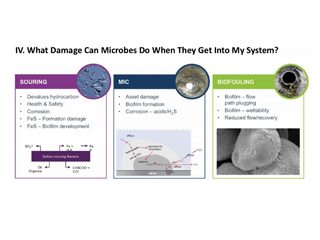
Institute News
The branch committee are pleased to announce the following upcoming events for which registration details will be sent to all members:
• Tuesday – 28/02/2022 Hybrid, Raza Amin, Ankaa Consulting, will talk on, “The Enterprise Holistic Digital Solution for Asset Integrity Management.”
• Tuesday – 28/03/2023 Hybrid, Kevin McDonald, Sonomatic, will talk on, “Effective Pipework analysis and inspection planning using Digital Twins.”
The branch is also very pleased to announce that ICR Aberdeen are to host the annual ABZ ICorr Industrial visit, planned for the 25th of April 2023. This innovative company offer specialist repair, inspection, and integrity solutions to a diverse range of industries. Places are limited for this event.
Further Information about the Aberdeen Branch, and past presentations, may be found on their website page: Aberdeen Branch – Institute of Corrosion (icorr.org), and to join the Aberdeen branch mailing list, please contact: icorrabz@gmail.com
Abstracts of potential papers for the branch technical programme are always welcome, and anyone wishing to join committee should correspond with the Aberdeen Chair, Dr Muhammad Ejaz,
itsejaz@yahoo.com
Institute News
CED Working Day and Symposium
The Corrosion Engineering Division invites you to join our annual working day and symposium on Thursday 27th April, 2023. The theme of this year’s symposium is, “Corrosion Prevention in the 21st Century: Learning from the past to protect the future.”
This one-day meeting will be the latest in a series of recent working days of the Institute of Corrosion’s Corrosion Engineering Division. The meeting will be held in person at the National Physical Laboratory (NPL), Teddington. This year’s meeting is wide ranging and covers ‘Corrosion Prevention in the 21st Century: Learning from the past to protect the future.’
After the technical talks and tour of the facilities and laboratories on site at NPL, the meeting will break up into the individual CED working groups. Where possible, agendas for the working group meetings will be published separately in advance on the CED website
(http://www.icorr.org/about_icorr/technical_divisions.phtml).
In addition to the technical talks and a tour of NPL, the 2023 Paul McIntyre Award will be presented.
The working day is a fantastic opportunity to network with other corrosion professionals from a range of different industry sectors; and, to learn about how corrosion prevention techniques can help preserve equipment and infrastructure occurs within their organisations.
Meeting Schedule:
09:00 – Registration & Welcome drinks
09:30 – Welcome & Introduction
09:45 – Industry Talks (x2)
10:45 – Refreshments & Exhibition
11:15 – Industry Talks (x2)
12:15 – Paul McIntyre Award Presentation
12:45 – Lunch & Networking
13:30 – Industry Talks (x2)
14:30 – Facility/Lab Tour
15:00 – CED Working Group Meetings
16:00 – Closing Discussions
16:15 – Finish
Institute News, Uncategorized
The Aberdeen Branch hosted the Young Engineer Programme (YEP) 2022 final on 24th November ’22, at the Palm Court Hotel, which was attended by over 40 in person, plus around 15 attendees online.
It was more than 18 months ago that the branch first considered hosting this event in Scotland, after 3 very successful events hosted by London Branch. David Mobbs, Trevor Osborne, and Danny Burkle, all very kindly supported the branch in the early days of YEP 2022.
The Young Engineer’s Programme was conceived some 10 years ago by the ICorr London Branch, and has been generously sponsored since then by BP, with the following in mind, perceived skill shortages in the industry, preparing graduates for entry into the industry with an enhanced skillset, and to be the first stage in achieving MICorr / CEng.
The ICorr YEP remains extremely popular with our younger and aspiring corrosion engineers, and this 4th YEP had 24 candidates, selected from over 50 applicants The Institute is very grateful to the Aberdeen committee who worked hard, especially Hooman Takhtechian (2021-2022 session chair) and Steve Paterson (YEP mentor supervisor / Case study organiser), superbly supported on the night and throughout the YEP by, Muhammad Ejaz / Adesiji Anjorin, the current branch chair and vice chair respectively.
This year’s selection criteria were:
• Early stage of their career related to corrosion.
• 2 to 6 years relevant experience.
• 35 and under.
• Relevant academic background.
• Based in Aberdeen, or willing to travel at their own cost.
The YEP committee had great difficulty in selecting those to go forward. The case study teams were based on their experience, academic background, and employer, to ensure not being in the same company as the other team members or the mentor, with the average experience for each team being 4 to 4.5 years.
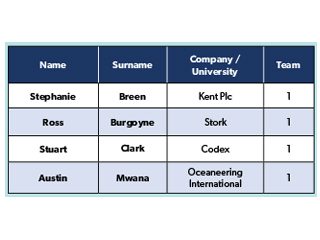
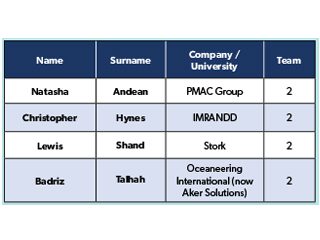
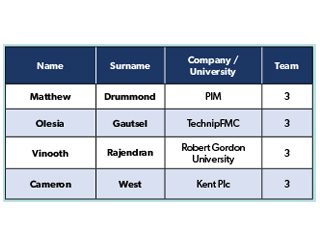
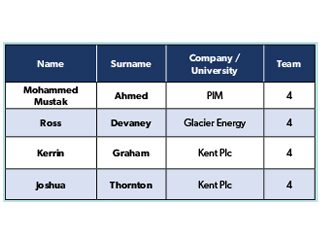
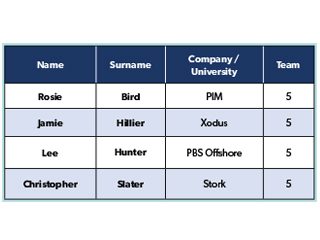
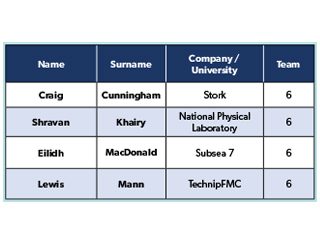
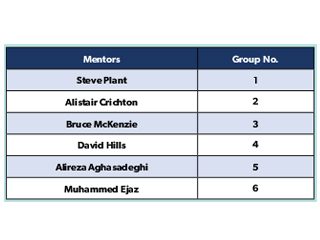
YEP 2022 Participants
The 2022 case study exercise was complex, and focused on good corrosion management approaches under difficult conditions, requiring careful consideration of:
• A 15 year old offshore platform in sweet service.
• Poor corrosion management to date.
• Possible new owner with another 10 years’ service.
• Possible tie-in of new field with slightly sour fluids.
• Dealing with an intermediary integrity services contractor.
• Difficult and demanding client.
• Subsidiary of international operator.
• Based on an actual platform in the North Sea.
• High level assessment (and ranking) of threats.
• Mitigation measures – corrosion management system.
• Material options for required new pipeline.
•
The management and impact of change in operations (MOC).
• Identifying all other relevant factors in dealing with client.
YEP 2022 Participants
The 2022 case study exercise was complex, and focused on good corrosion management approaches under difficult conditions, requiring careful consideration of:
• A 15 year old offshore platform in sweet service.
• Poor corrosion management to date.
• Possible new owner with another 10 years’ service.
• Possible tie-in of new field with slightly sour fluids.
• Dealing with an intermediary integrity services contractor.
• Difficult and demanding client.
• Subsidiary of international operator.
• Based on an actual platform in the North Sea.
• High level assessment (and ranking) of threats.
• Mitigation measures – corrosion management system.
• Material options for required new pipeline.
• The management and impact of change in operations (MOC).
• Identifying all other relevant factors in dealing with client.
Some key aspects of the exercise were to:
• Analyse and discuss the information and data provided.
• Identify any gaps in information and any assumptions that may need to be made.
• Perform a high-level risk assessment to identify key threats to the mechanical integrity of the pressurised systems (structural integrity was excluded).
• Identify what further information or data required for the other tasks in the exercise.
• Propose a systematic approach to manage the key threats including mitigation measures, corrosion control requirements, performance monitoring, and the resources required to manage the process.
• Propose materials of construction for a pipeline, including welding consumables, and any testing requirements to tie-back the new reservoir to the platform, and explain the basis for the materials selection and how any corrosion threats will be mitigated.
• Identify what changes, if any, to the existing facilities would be required should the new sour reservoir be tied-back to the platform.
• Propose a strategy for convincing Capercaillie Energy (the integrity management contractor) that your approach is the optimal solution and that you are the right team to do the job.
The marking criteria for the YEP case study presentation were:
1. Analysis of the scenario and current integrity status of the pressurised systems of the platform (20 marks).
2. Application of a systematic methodology to manage corrosion and surveillance activities (20 marks).
3. Viability of the proposed approach to prolong service life (10 marks).
4. Assessment of material options for the new pipeline (10 marks).
5. Assessment of the impact of change in operation with H2S (10 marks).
6. Identification and assessment of factors in dealing with the client (10 marks).
7. Overall quality and balance of the presentation, plus team coordination as demonstrated by the presentation (20 marks). Only 20mins were allowed per team for their presentation, with strict penalties being applied for those going over.
The Aberdeen committee would like to offer its special thanks to all of the following lecturers, mentors, and judges.
YEP 2022 course lecturers
The YEP course mentors were:
The judges on the night were:
• Chris Williams, (BP Sunbury – Key Sponsor).
• Susan Cushnaghan, (formerly of Shell Aberdeen).
• Stephen Tate (2022-2024 ICorr President).
All the participating teams engaged fully with the brief and gave a tremendous series of presentations providing many different solutions to the task in hand including net zero considerations, their enthusiasm was a joy to watch.
Unfortunately. Teams 2 and 6 were missing colleagues on the night due to illness, but they still performed brilliantly.
Team members
It was a very hard decision for the judges, but in the end Team 5 stood out as the best all-rounders and enactors of the task in hand. The Institute offers their warmest congratulations to all the Team 5 members, as they head off to AMPP Annual Conference & Expo 2023 19-23 March, all expenses paid courtesy of key sponsor, BP.
Winner of the Leadership Prize
After receiving feedback from all the mentors, judges and committee members, based on the performance during the whole programme, teamwork and presentation skills on the competition evening, Eilidh Macdonald was selected as the outstanding YEP 2022 individual participant. The Institute also offers their congratulations to Eilidh on receiving this recognition, who will also be eligible to attend the AMPP leadership course, all expenses paid. This is very well deserved.
Some key aspects of the exercise were to:
• Analyse and discuss the information and data provided.
• Identify any gaps in information and any assumptions that may need to be made.
• Perform a high-level risk assessment to identify key threats to the mechanical integrity of the pressurised systems (structural integrity was excluded).
• Identify what further information or data required for the other tasks in the exercise.
• Propose a systematic approach to manage the key threats including mitigation measures, corrosion control requirements, performance monitoring, and the resources required to manage the process.
• Propose materials of construction for a pipeline, including welding consumables, and any testing requirements to tie-back the new reservoir to the platform, and explain the basis for the materials selection and how any corrosion threats will be mitigated.
• Identify what changes, if any, to the existing facilities would be required should the new sour reservoir be tied-back to the platform.
• Propose a strategy for convincing Capercaillie Energy (the integrity management contractor) that your approach is the optimal solution and that you are the right team to do the job.
The marking criteria for the YEP case study presentation were:
1. Analysis of the scenario and current integrity status of the pressurised systems of the platform (20 marks).
2. Application of a systematic methodology to manage corrosion and surveillance activities (20 marks).
3. Viability of the proposed approach to prolong service life (10 marks).
4. Assessment of material options for the new pipeline (10 marks).
5. Assessment of the impact of change in operation with H2S (10 marks).
6. Identification and assessment of factors in dealing with the client (10 marks).
7. Overall quality and balance of the presentation, plus team coordination as demonstrated by the presentation (20 marks).
Only 20mins were allowed per team for their presentation, with strict penalties being applied for those going over.
The Aberdeen committee would like to offer its special thanks to all of the following lecturers, mentors, and judges.
YEP 2022 course lecturers
The YEP course mentors were:
The judges on the night were:
• Chris Williams, (BP Sunbury – Key Sponsor).
• Susan Cushnaghan, (formerly of Shell Aberdeen).
• Stephen Tate (2022-2024 ICorr President).
All the participating teams engaged fully with the brief and gave a tremendous series of presentations providing many different solutions to the task in hand including net zero considerations, their enthusiasm was a joy to watch.
Unfortunately. Teams 2 and 6 were missing colleagues on the night due to illness, but they still performed brilliantly.
Team members
It was a very hard decision for the judges, but in the end Team 5 stood out as the best all-rounders and enactors of the task in hand. The Institute offers their warmest congratulations to all the Team 5 members, as they head off to AMPP Annual Conference & Expo 2023 19-23 March, all expenses paid courtesy of key sponsor, BP.
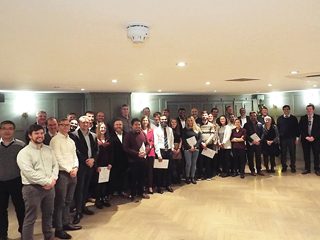
Winner of the Leadership Prize
After receiving feedback from all the mentors, judges and committee members, based on the performance during the whole programme, teamwork and presentation skills on the competition evening, Eilidh Macdonald was selected as the outstanding YEP 2022 individual participant. The Institute also offers their congratulations to Eilidh on receiving this recognition, who will also be eligible to attend the AMPP leadership course, all expenses paid. This is very well deserved.
YEP 2024
The Institute are already planning for YEP 2024, which will be managed by the Young ICorr Division.
Details will be announced later during 2023, however interested parties can register their advance interest
to the new YICorr chair, James McGladdery,
James.McGladdery@uknnl.com
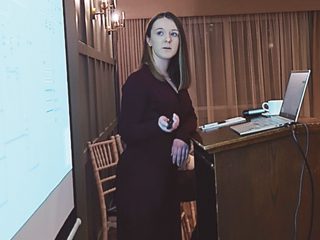
Eilidh MacDonald from Team 6, Winner of the Leadership Prize.
CAPTIONS:
YEP 2022 coordinator, Hooman Takhtechian.
YEP 2022 case study lead, and the ICorr CED All Energy chair, Steve Paterson, explains proceedings.
Contestants, mentors, judges and ABZ committee members on the night.
The YEP 2022 winning team 5, Judges, President, and team 5 mentor. From left to right, Rosie Bird, Lee Hunter, Jamie Hillier, Chris Williams (Judge), Susan Cushnaghan (Judge), Stephen Tate (Judge), Christopher Slater, Alireza Aghasadeghi (mentor), and Steve Paterson (Case study lead).
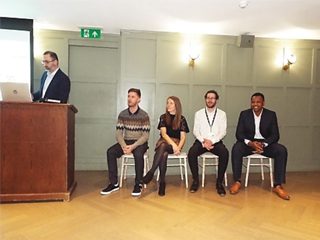
Team 1
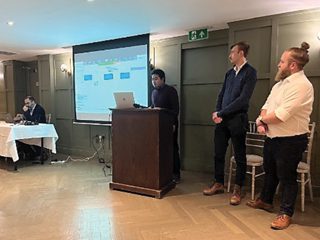
Team2
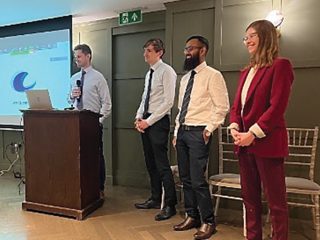
Team 3
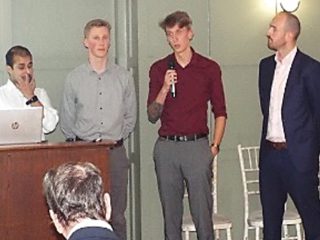
Team 4
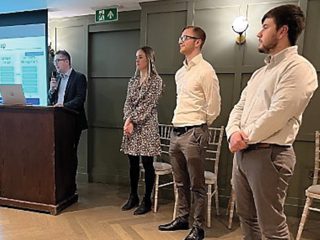
Team 5

Team 6

Institute News
Following the popular festive quizzes of 2020 and 2021, Young ICorr continued this tradition into the holiday season of 2022. Taking advantage of the online forum, the meeting was widely attended with participants from across the world, and consisted of two parts, a talk entitled “A tour of my career and some of the most rewarding challenges” given by Stephen Tate, recently elected as the new ICorr President, and a quiz with a festive twist prepared by Young ICorr committee members, including Izabela Gajewska, Danny Burkle, Harry Wright, and the new Young ICorr chairman, James McGladdery, who also hosted the evening.
During his introductory talk, ICorr’s new President took the participants through various aspects of his career in energy, from the early days of North Sea operations, to his present experiences with both modern and mature assets, covering 42 years of practical experience in the energy sector. Stephen has worked many different roles, including Technical Author, Snr. Corrosion Engineer, Corrosion Technical Authority, and Engineering Manager. He inspired attendees with accounts of his learning opportunities over his long career, as well as its challenges. He emphasised that his present knowledge is built on a foundation of much practical experience from past events and experiences, but corrosion control has been a constant theme throughout.
Following the talk, teams were allocated to enable participants to meet other Young ICorr members, do some networking, and work together answering questions in the festive quiz, comprising multiple-choice questions as well as corrosion, materials, and electrochemistry rounds. The participants learnt what the Christmas tree in the oil and gas industry is, what corrosion mechanisms would affect Santa’s stainless-steel sleigh on the salt covered icy roads, and that “pigs” are not only to be wrapped in blankets but they are also widely used as inspection tools in the Oil and Gas industry to detect issues in pipelines, including corrosion!
In all this was a very successful event, which was well received by everyone. To become part of the Young ICorr community, or for more information
about what they do, and how they can help you, contact the chairman at,
James.McGladdery@uknnl.com
Follow Young ICorr on LinkedIn to ensure you do not miss out on future events:


